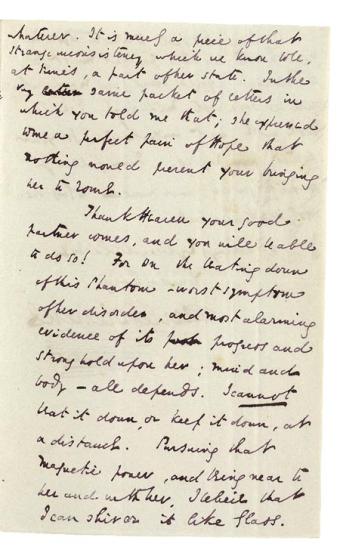
Autograph letter signed, Genoa, 4 February 1845, to Emile de la Rue
Purchased in 1968
For several years prior to first meeting Dickens in 1844, Madame de la Rue had suffered from such generalized symptoms as insomnia, headaches, nervous tics, and convulsions. Over the course of his numerous mesmeric sessions, Dickens concluded that she was haunted by an evil phantom, alternately referred to in his detailed and extensive letters to her husband as "the bad figure," "Bad Spirit, "this creature," or "the shadow." Dickens came to believe that he was engaged in a powerful struggle with "this Phantom" for control of the "mind and body" of Madame de la Rue. In this letter he asserts confidence in his mesmeric abilities: "Pursuing that Magnetic power, and being near to her and with her, I believe that I can shiver it [the phantom] like Glass."
Mesmerism
In his life and art, Dickens worked energetically for healing. His fiction exposed many of the social ills of his day, and a significant portion of his later journalism is devoted to an impassioned campaign to improve sanitation and public health. Although he was a committed evolutionist and progressive in his attitude toward science and the improvements wrought by technological advances, he was also, by imagination and temperament, attracted to the fantastic and pseudoscientific. This was manifested in his interest in spontaneous combustion and phrenology as well as his fervent belief and active experiments in mesmerism (or "animal magnetism"), an early type of hypnotism.
Dickens was introduced to mesmerism through Dr. John Elliotson, his family physician and one of his "most intimate and valued friends." He became convinced of the therapeutic effects of mesmerism after witnessing Elliotson's demonstrations in 1838, and, although there is no record of Dickens undergoing the procedure, he learned to mesmerize others. Throughout the 1840s, he conducted mesmeric experiments on his wife and friends.
whatever. It is merely a piece of that strange inconsistency which we know to be, at times, a part of her state. In the very same packet of letters in which you told me that; she expressed to me a perfect pain of Hope that nothing would prevent your bringing her to Rome.
Thank Heaven your good partner comes, and you will be able to do so! For on the beating down of this Phantom—worst symptom of her disorder, and most alarming evidence of its progress and strong hold upon her; mind and body—all depends. I cannot beat it down, or keep it down, at a distance. Pursuing that Magnetic power, and being near to her and with her, I believe that I can shiver it like Glass.
